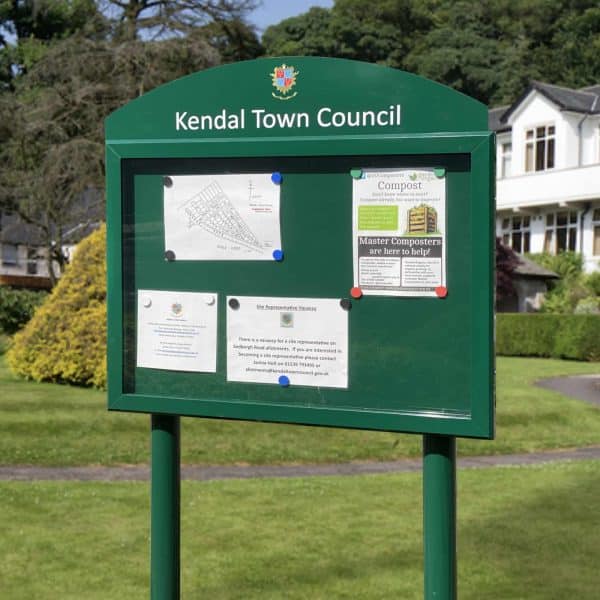Notice Board Company in Sunderland
At Noticeboards Online, we are a family-owned and operated business providing businesses, homes, schools, parishes, churches and other institutions all over the country with the best quality notice boards that truly stand the test of time.
Notice Boards That Help Deliver Your Message
An outdoor notice board should clearly display your announcements and withstand the worst weather. Our external notice boards are designed use on Walls, Posts and can also be Rail Mounted. We have one of the UK’s widest range of external weatherproof notice boards. Choose from aluminium, wood or recycled plastic for your new Notice Board.




Outdoor Wall Notice Boards
If you are buying a notice board for a wall in Sunderland, we have a massive range with something for every budget.
Notice Boards Online has delivered thousands of wall poster case throughout the region including North East England.

Notice Boards On Posts
If you are looking for a free standing post mounted notice board in Sunderland, we have a massive choice with something for every budget.
Notice Boards Online has delivered thousands of wall notice boards throughout the region including North East England.
Noticeboard Manufacturers In Sunderland
Our head office is in Kendal, The Lake District, and we have installation teams throughout England and this allows us to cover the entire mainland UK including North East England. So get in touch with us at Noticeboards Online and make an enquiry today. In addition to your Notice Board being sophisticated, it will help you showcase your messages.
Notice Board Installation In Sunderland, North East England
All of our installation teams have PASMA and IPAF certificates for working at height and always adhere to our company Health & Safety procedures. We are members of the Safe Contractors Accreditation Scheme and are fully conversant with the recent DDA requirements.
We offer a comprehensive fully insured national installation service including Sunderland.
We complete as much work as possible off-site, simplifying the installation. Our installation teams are highly experienced, and we understand the need for the work to be quick, quiet, clean and safe.

About Sunderland
Sunderland () is a harbor city and the administrative centre of the City of Sunderland metropolitan borough in Tyne and Wear, England. Sunderland is situated near the mouth of the River Wear and it flows through the city and afterward the city of Durham, which is in this area 12 miles (19 km) south-west from the city centre. Sunderland is within the historic county of Durham.
There were three native settlements by the mouth of the River Wear upon the site of modern-day Sunderland. On the north side of the river, Monkwearmouth was contracted in 674. King Ecgfrith of Northumbria granted home to Benedict Biscop to found a monastery which, together later Jarrow monastery, later formed the dual Monkwearmouth-Jarrow Abbey. In 685, Ecgfrith contracted Benedict Biscop a “sunder-land”. Also in 685 The Venerable Bede, moved to the newly founded Jarrow monastery. He had started his monastic career at Monkwearmouth monastery and forward-thinking wrote that he was “ácenned on sundorlande þæs ylcan mynstres” (born in a separate land of this thesame monastery). This can be taken as “sundorlande” being Old English for “separate land” or to the harmony of Sunderland. Alternatively, it is realizable that Sunderland was progressive named in honour of Bede’s connections to the area, by people au fait with this verification of his. West of the Sunderland settlement, also on the Wear’s southern bank, the third unity of Bishopwearmouth was founded in 930.
The second pact of Sunderland, which grew as a fishing settlement, was settled a town charter in 1179. It grew as a port. The town started to trade coal and salt in the song of ships starting to be built on the river in the 14th century. By the 19th century, the Port of Sunderland at Sunderland Docks had absorbed the extra two settlements, due to the growing economic importance of the shipbuilding docks. Following fall of its time-honored industries in the late 20th century, the area became a middle for the automotive industry, science-and-technology and the serve sector. In 1992, the borough of Sunderland was approved city status.
A person from Sunderland is sometimes known as a Mackem. This term originated as recently as the to the lead 1980s, its use and reaction by Sunderland residents, particularly in the middle of the older generations, is not universal. At one time, Sunderland-built ships were called “Jamies”, in contrast bearing in mind those from approximately the River Tyne, which were known as “Geordies”, although in the deed of “Jamie” it is not known whether this was ever extended to people.Newcastle on Tyne is nearly 10 miles (16 km) north-west of the city centre.